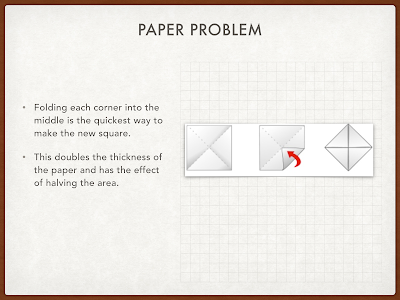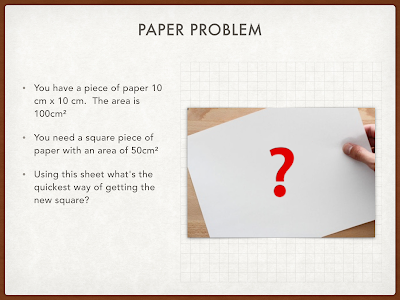Here is the solution to the head scratcher from yesterday!
Tuesday 28 February 2017
Monday 27 February 2017
Monday Maths #2
Did you enjoy last week's problem?
Here is another one to get you thinking!
As always, solution tomorrow!
Here is another one to get you thinking!
As always, solution tomorrow!
Tuesday 21 February 2017
Paper Problem Solution
How did you get on with the puzzle yesterday?
Here is the solution to put you out of your misery, or to confirm your success!
Here is the solution to put you out of your misery, or to confirm your success!
Monday 20 February 2017
Monday Morning Maths!
Taking a leaf out of Mathematics Mastery's book I decided to publish a quick maths teaser this week.
I will be putting one of these out each Monday morning with the solution to follow the next day.
Please leave a comment with an answer!
I will be putting one of these out each Monday morning with the solution to follow the next day.
Please leave a comment with an answer!
Friday 17 February 2017
The Chartered College of Teaching
Twitter was alive yesterday with ideas, comments and inspirational quotations about the launch of the #collectivevoice campaign.
It was the clarion call of the new professional body in education, the Chartered College of Teaching, established last year with a guarantee of Government funding to the tune of
£5million over 4 years.
The college inherited the Royal Charter from the College of Teaching at the end of last year, a shift that marked yet another evolution in the professional body that represents teachers. Originally begun in 1846 as the Society of Teachers, it was incorporated by Royal Charter in 1849 and largely remained unchanged until the rebrand in 1998 to the College of Teachers.
The new organisation has a clear vision, and seems keen to distance itself from its predecessors as a refreshed and reinvigorated organisation. As expressed by Chief Executive Dame Alison Peacock (@AlisonMPeacock), the Chartered College aims to "blend research and practice within teaching". Whilst this isn't a revolutionary statement in itself, in a world where teachers' professional judgements and autonomy are being maligned on what feels like a daily basis, it is an encouraging point of view. The College goes on to state that, "teachers deserve greater recognition of their value to society and they should be entrusted with responsibility for shaping the future of their profession." I think this is something that all of us can agree with.
The College also seeks to support and further promote professional rigour within teaching by establishing a 'Chartered Teacher' status which will offer career long development and "an ambitious career framework". The CTeach, as it will be called, is currently ind development with only some key goals stated. Applications open in September 2017, by which time the content, objectives and purpose will be clearer. The goals for the framework are in keeping with the College's push to re-establish the wider professional voice. They will recognise teachers' expertise, their commitment to the profession, and provide a structured platform to share best practice.
Having just developed a blog to share professional ideas and research, it is particularly heartening to hear that the final significant feature of the Chartered College of Teaching is that it will "bridge the gap between teachers and research" to "develop the evidence-informed expertise necessary to achieve and maintain genuine excellence". Whilst teachers have been able to access pedagogy before, the College's approach of combining online sources, traditional journals and magazines, with a fresh peer reviewed publication will allow as many professionals as possible to engage.
Even in just under a decade in the profession I have seen teaching bodies and agencies change or become obsolete (The General Teaching Council? The National College?). I am hopeful for the future of the new Chartered College of Teaching, because of its clearly defined vision and appropriate goals to reinvigorate and re-professionalise the teaching work force.
Wednesday 15 February 2017
One Best Thing: Quality Writing through Quality Talk
One Best Thing is a range of free CPD resources created by Apple Distinguished Educators.
I would like to draw attention to the One Best Thing created by Paul Hutton, an ADE who has supported the school I work in to become an Apple Distinguished School.
Paul's book outlines the benefits of talk to enhance writing outcomes and extols the virtues of using technology to develop the children's engagement.
Top Three Outcomes from One Best Thing: Quality Writing through Quality Talk
- The use of both technology can a have a huge impact the children's engagement but at no point must the role of the teacher be diminished; “The role of the teacher is paramount in finding out what pupils can already do, challenging pupils to push themselves and encouraging the habit of using more ambitious grammatical techniques and language structures"
- Writing skills such as redrafting and re-editing are much more confidently used by including technology; “Pupils will record, review, reject, re-record, review, reject, until they have a final recording that satisfies them. I am not so sure they would be so keen...if the outcome of the activity were dependent on a final paper draft.”
- Digital technologies must work in partnership with the traditional methods, we must give children the power of choice; “Pupils do not perceive technology as something “special”; to them it is synonymous with pencils and paper and is just as valid a creation tool. ”
Paul's work has a great impact on the children in the case study so if you would like to know more about Paul's book you can find it here.
All the links to the digital and non digital resources are included on the final pages.
Labels:
ADE,
Apple,
cpd,
digital learning,
onebestthing,
writing
Location:
London, UK
Welcome!
I have been building up to the decision to publish a blog for a while, mostly inspired by the work of other professionals on Twitter. I found choosing a topic difficult, plagued with thoughts around what on earth I could offer that other, busy people would want to read.
I decided that in fact it was being busy which was the key to what I could contribute; if I could find useful eductional articles and ideas from the internet then I could condense them into bite size chunks for other professionals to read. And thus Pop Up Pedagogy was born!
The blog will undoubtedly change and refine its focus over time but for now I will write about research and current trends in education, with a particular eye on digital technologies, mathematics learning and the wider British educational political landscape.
Thoughts, ideas or disagreements are welcome as I look forward to engaging with you all.
Location:
London, UK
Subscribe to:
Posts (Atom)







